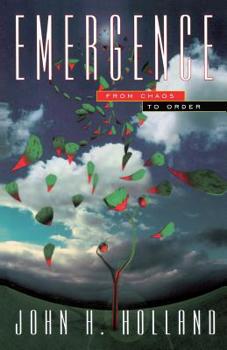Emergence: From Chaos to Order
Select Format
Select Condition 
Book Overview
In this important book, John H. Holland dramatically shows us that the "emergence" of order from disorder has much to teach us about life, mind and organizations. Creative activities in both the arts and the sciences depend upon an ability to model the world. The most creative of those models exhibits emergent properties, so that "what comes out is more than what goes in." From the ingenious checkers-playing computer that started beating its creator in game after game, to the emotive creations of the poet, Emergence shows that Holland's theory successfully predicts many complex behaviors in art and science.
Format:Paperback
Language:English
ISBN:0738201421
ISBN13:9780738201429
Release Date:April 1999
Publisher:Basic Books
Length:272 Pages
Weight:0.75 lbs.
Dimensions:0.7" x 5.3" x 8.2"
Customer Reviews
5 ratings
Another great book by Holland
Published by Thriftbooks.com User , 17 years ago
Expands on Holland's previous book Hidden Order. It presents an interesting method for understanding complexity and emergence. Highly recommended for those attempting to understand complex adaptive systems.
First steps towards a future theory of emergence
Published by Thriftbooks.com User , 18 years ago
I just read Emergence in preperation for my oral qualifying exams for a Ph.D. in computer science and cognitive science. I disagree with many of the negative reviewers -- this book is well-worth the read. I share some frustration over this book due to the way it seems to scratch the surface. The book's strength seems to be in asking the right questions and pointing the way towards some future science of emergent behavior. The book is too short for my taste -- in many of the later chapters Holland makes thought-provoking, deep remarks, without the follow-up and commentary that they leave me hoping for. But again, his main purpose seems to be in making people think about the issues. And he provides some formalisms that might be part of some future theory -- his constrained generating procedures (CGPs) and the variable "CGP-v" recall constructs such as the Turing machine for studying computability. The strengths of the book lie in: 1) Discussion of the nature of modeling in science, and computer modeling in particular. This is discussed with clarity and pragmatism. 2) The beginnings of a framework in which to study emergence in multi-agent systems. 3) Discussion of the importance of metaphor/analogy in the creative scientific process. I didn't expect this to appear in the book but it was very welcome, and especially appropriate due to the role played by Mitchell's and Hofstadter's "Copycat" model (of analog-making itself) as it motivates the expansion of CGPs to CGP-v's as the book progresses. Overall, I recommend this book highly to readers interested in the beginnings of this exciting new science, that really is in its infancy. I gave it 4 stars just because I felt like Holland had a lot more to say in the later chapters and left too much "as an exercise for the reader." I hope he does follow-on work that clarifies his vision for a future science of emergence!
A contribution for the understanding of the complexity
Published by Thriftbooks.com User , 23 years ago
It is very important to the universal thinking the unsderstanding about complexity and its cognitive perception by humans. I read Dr. Holland's first book in London at 1993 and that time I follow his steps in order to reach a meaningfull knowledge to our lives and our existence in the universe. The title of the book is very difficult to develop but Dr. Holland has a special skill to clarify and transmmit the ideas breaking down our paradigm about the universe and the world and life complexity.
One of the most important books published for a long time
Published by Thriftbooks.com User , 25 years ago
This book clearly and concisely states ideas that are fundamental to the whole of scientific endevour. It puts into perspective the debate on thermodynamic chaotic phenomena as in Prigogine and shows where we should be looking for the arrow of time.
Good
Published by Thriftbooks.com User , 26 years ago
A good book, giving a nice introduction to the subject. Gets a little mathematical in places, but the ideas seem to be spot on if you can look beyond the maths.






